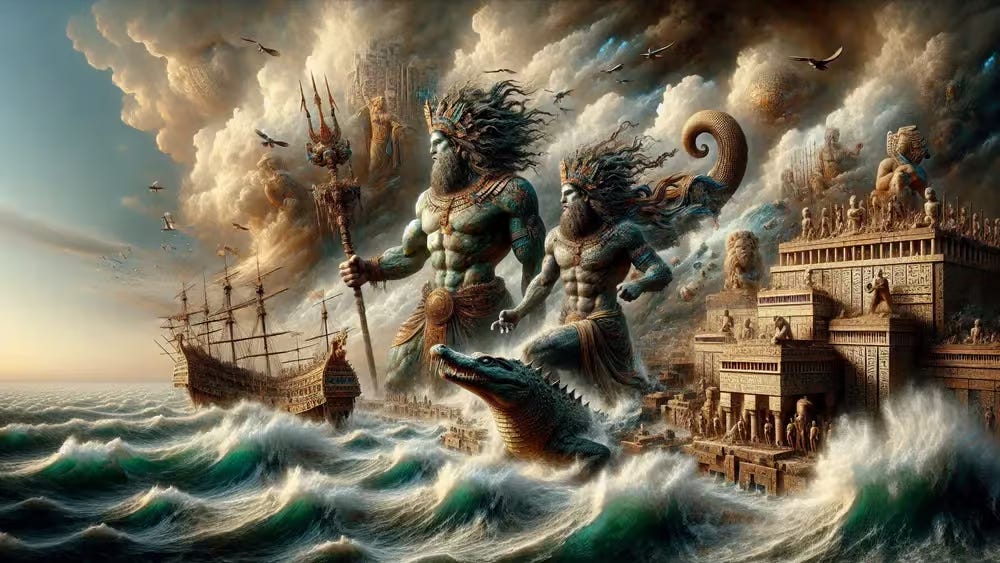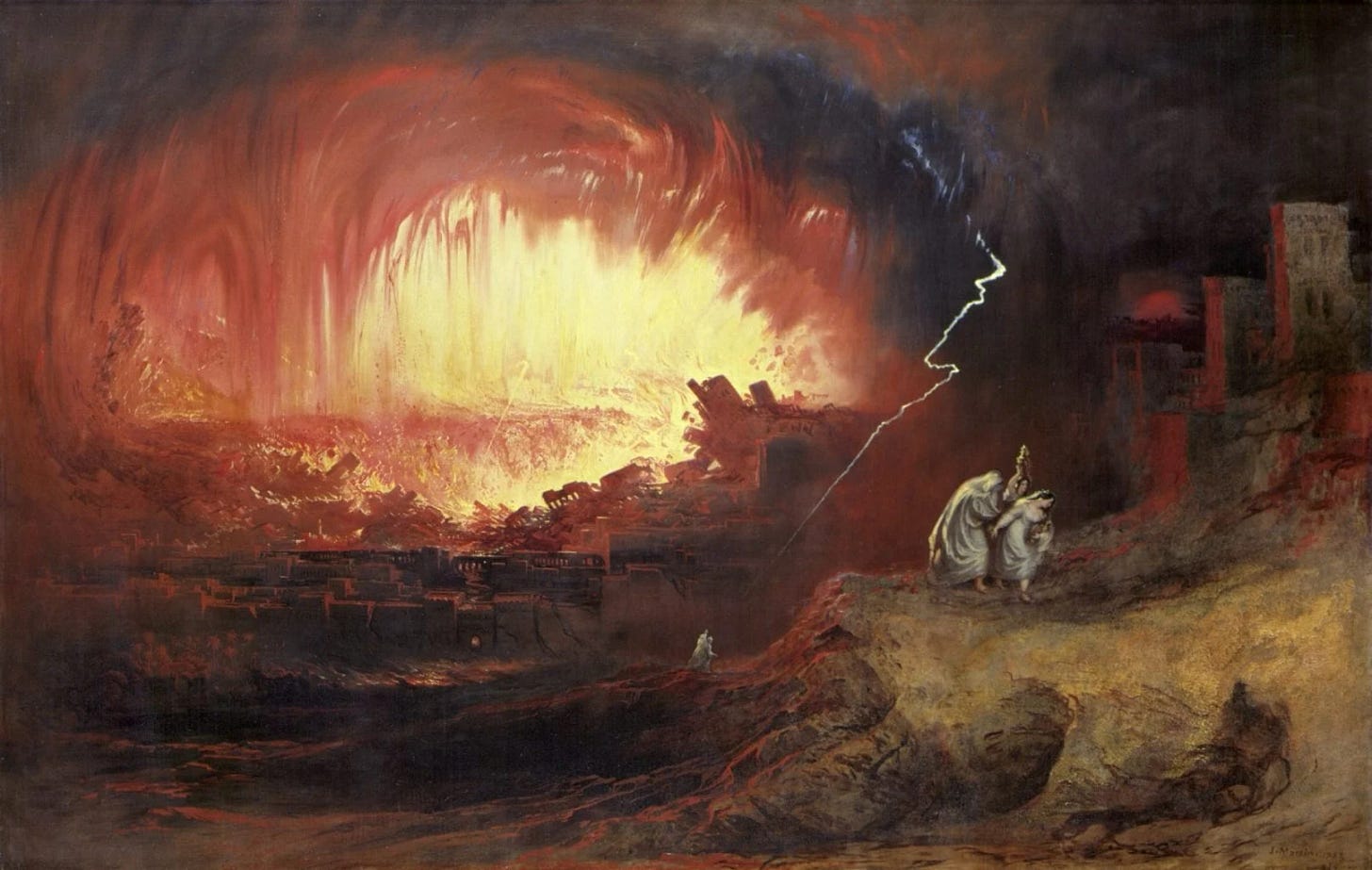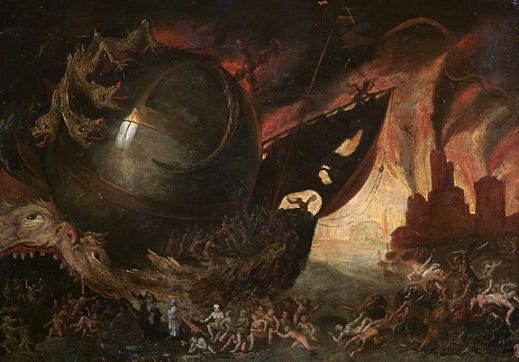Holy Saturday: "Who is this King of Glory?"
The Harrowing of Hades: What did Jesus do between Good Friday and Easter Morning?
In my post yesterday, I talked about Jesus descending to Sheol, the realm of the dead, where he kept his promise to meet the thief on the cross in paradise.
But there’s a lot more that happened in Sheol. That’s what this post is about, and I’ll tell you about it from an unexpected place: Psalm 24. (Here’s a sermon I preached a sermon on this recently.)
Psalm 24 appears to be about worship, upon a casual reading. And it is. But it’s much more than that too. Psalm 24 is also a prophetic anticipation of Christ’s descent and the “Harrowing of Hades,” where Jesus assaulted the gates of Satan’s stronghold in Sheol. In other words, Psalm 24 is a polemic against Baal worship that was common in Israel at the time it was written.
Baal worship was a constant temptation for Israel. God’s prophets frequently mocked and taunted Baal and his worshipers for their lies and detestable practices, like cult prostitution and child sacrifice. Clearly, Baal was in league with Satan, and some have suggested he is Satan himself.
Mark 3:22-27 gives this account (note the connections between Satan and “Beelzebul,” another title for Baal): “And the scribes who came down from Jerusalem were saying, “He is possessed by Beelzebul,” and “by the prince of demons he casts out the demons.” 23 And he called them to him and said to them in parables, “How can Satan cast out Satan? 24 If a kingdom is divided against itself, that kingdom cannot stand. 25 And if a house is divided against itself, that house will not be able to stand. 26 And if Satan has risen up against himself and is divided, he cannot stand, but is coming to an end. 27 But no one can enter a strong man’s house and plunder his goods, unless he first binds the strong man. Then indeed he may plunder his house.”
Whether or not Baal is Satan, or merely in league with Satan, Baal was and is a real demonic spirit, exceedingly wicked and destructive. And Psalm 24 tells about how Christ crushed him at the cross. I’ll set this up by going through Psalm 24, showing how it builds to the crescendo of Jesus storming Satan’s hellish castle to rescue the souls of his people.
God Alone is Worthy of Worship
Psalm 24 opens with a bold declaration: “The earth is the LORD’s and the fullness thereof, the world and those who dwell therein. For he has founded it upon the seas and established it upon the rivers” (vv. 1-2). The psalmist asserts that everything in all creation belongs to the LORD because He is its Creator. This is no small claim in the context of ancient Israel, where all the neighboring nations worshiped Baal.
Baal was considered the Canaanite storm god, believed to control rain and fertility. The Baal Cycle, a series of stories unearthed in the ancient city of Ugarit about 100 years ago, reveals how the Canaanites viewed Baal as supreme after defeating Yam, the sea god, and Nahar, the river god.
Those two names, Yam and Nahar, are significant because Psalm 24 uses the same Hebrew words yam (for “sea”) and nahar (for “rivers”) in verse 2, which describes the LORD as having established his creation upon them. According to the Baal Cycle, Yam was the god of the sea, considered supreme and most powerful over all the gods. Nahar was the god of the rivers, sometimes considered the same as Yam and at other times considered his son. Either way, the Baal Cycle claims that Baal become supreme by conquering Yam and ascending the throne.
Psalm 24 refutes this directly. By declaring that Yahweh “founded” the earth upon the seas and rivers, it is saying, in effect, “Yam is nothing. Baal is nothing. Yahweh is creator and supreme over all of them.”
This was a deliberate taunt. It was a theological slap in the face to anyone who thought Baal held power over creation. The Bible consistently reinforces this truth. In Genesis 1, God creates from nothing, establishing His authority over all things. In Acts 17, Paul echoes this at the Areopagus, proclaiming that “The God who made the world and everything in it, being Lord of heaven and earth, does not live in temples made by man, nor is he served by human hands, as though he needed anything, since he himself gives to all mankind life and breath and everything” (v24-25).
Psalm 24 sets the stage for the rest of its message: Yahweh alone is worthy of worship because He alone is the Creator and Sovereign.
Worship Requires Clean Hands and a Pure Heart
Having established Yahweh’s supremacy, the Psalm shifts to a question of who has the access to God in worship. It says, “Who shall ascend the hill of the Lord? And who shall stand in his holy place?” (v. 3). In ancient Israel, ascending the hill meant going up to the temple in Jerusalem, the place where God’s presence dwelt. The answer is striking: “He who has clean hands and a pure heart, who does not lift up his soul to what is false and does not swear deceitfully” (v. 4). This person, the psalm says, “will receive blessing from the Lord and righteousness from the God of his salvation” (v. 5).
Obviously, Baal is unworthy of ascending the LORD’s hill. He’s a wicked, rebellious, demonic spirit. But also, it seems as though no human could qualify either. It seems to be an impossible standard. Who among us has perfectly clean hands or a pure heart? We’ve all sinned and fallen short of his glory.
This is where Psalm 24 begins to glimmer in anticipation of the gospel. While the psalm was written centuries before Christ, it prophetically anticipates the work of Jesus. Only Christ has truly clean hands and a pure heart, being sinless and perfect. Through His death and resurrection, He imputes His righteousness to those who trust in Him, making them worthy to ascend the hill and stand in his presence. This is the agenda God set forth in motion that will ultimately be fulfilled in Christ.
This is the heart of justification: we don’t ascend God’s hill by our own merit, but by His grace. Those who trust in him and have a humble disposition towards him “receive… righteousness from the God of salvation.” By faith, we are welcomed into worship and receive blessing and righteousness. The psalm’s language of “not lifting up the soul to what is false” also serves as a jab at Baal worship, which is rooted in lies and deception. True worshipers reject such falsehoods and cling to the truth of Yahweh’s covenant love.
Christ Defeated Satan and All Evil Powers
The final section crescendos into a triumphant scene. This imagery is vivid and dramatic, and its full significance comes into focus when we see it as a prophetic depiction of Christ’s victory over death.
Here again is another polemic against Baal worship. In one scene of the Baal Cycle, Baal’s minions are terrified to face Yam in battle, because Yam was thought to be much more powerful. So Baal gets annoyed by them and calls them to muster their courage by saying, “Lift up your heads, O gods,” before leading them to victory.
In another account, after defeating Yam, Baal wants to expand his reign by traveling to the underworld and conquering Mot, the god of the underworld, the god of the dead. After winning these battles, Baal decides to build a palace in his honor in the underworld, where he would live.
But it’s all a lie. Baal is presented as the powerful, courageous hero in their account. The Baal Cycle gives him credit defeating death, but that’s not what actually happened. Baal did reside in the underworld, but not for the reasons they say. Baal lived in the underworld because he failed in his futile attempt to overthrow the LORD. Therefore, the LORD sent him to the underworld under a divine curse. Here’s how Isaiah 14:13-15 records the incident:
13 You said in your heart,
‘I will ascend to heaven;
above the stars of God
I will set my throne on high;
I will sit on the mount of assembly
in the far reaches of the north;
14 I will ascend above the heights of the clouds;
I will make myself like the Most High.’
15 But you are brought down to Sheol,
to the far reaches of the pit.
In other words, Baal lives in the underworld because he is banished there as a profane thing.
It gets even more interesting. Psalm 24 repurposes language from the Baal cycle and throws it back as an insult, which depicts Christ’s “harrowing of Hades.”
The “gates” and “ancient doors” language of Psalm 24 evokes Baal’s stronghold of death in the underworld. The psalm declares that it is Yahweh, the King of Glory, who enters the underworld upon his death on the cross, but enters victoriously to release people from death, not to be held there forever. Jesus enters Hades (i.e., Sheol, the underworld), not to suffer, but to proclaim victory, because death cannot hold him down.
This even is pictured as Christ storming these gates of Satan’s palace as a powerful warrior, strong and mighty, mighty in battle. As this image of a powerful warrior unfolds, he marches up to the gates of Satan’s death palace, shouting, “lift up your heads, you gates! Lift up your heads, you ancient doors!”
A voice responds from within the palace, asking, “Who is the King of glory?” The answer isn’t Baal! He’s nothing, a defeated foe. The King of Glory is none other than Jesus Christ, who has arrived to assault the devil’s stronghold and plunder the souls of faithful men and women from his grasp.
The New Testament underscores this victory. In Matthew 16, Jesus declares that the gates of hell will not prevail against His church. The church is on offense, the gates are defensive structures. Christ is “building” his church by leading us on the offensive to take ground from his enemies.
In Hebrews 2:14-15, we read that through His death, Jesus destroyed “the one who has the power of death, that is, the devil,” freeing those subject to lifelong slavery. And in 1 Corinthians 15, Paul taunts death itself: “O death, where is your victory? O death, where is your sting?” Psalm 24’s call to “lift up your heads” is thus a mocking reversal of Baal’s boast, proclaiming that Christ, not Baal, has conquered the grave.
This victory is why Yahweh alone is worthy of worship. He is not a distant deity, but the God who fights for His people, defeating their greatest enemies. Satan, like Baal, sought to usurp God’s throne, as Isaiah 14 describes, but was cast down. His attempt to destroy Jesus through the cross backfired spectacularly, as Christ’s death became the means of his defeat. As Paul notes in 1 Corinthians 2:8, the rulers of this age—demonic powers—did not understand God’s plan, “for if they had, they would not have crucified the Lord of Glory.”
Conclusion
In Christ’s death, he experienced the full reality of human mortality. His body was laid in the tomb while his soul descended to Sheol. However, Christ’s descent was ultimately about completing his victory. He traversed every tier of Sheol, liberating the righteous from Abraham’s Bosom, proclaiming victory over the wicked in Hades, and subduing rebellious angels in Tartarus. He broke the bars of Sheol, seized the keys of death and Hades, bound the ancient dragon, and led the faithful into the presence of God.
[Note: Here is a short, animated depiction of the Harrowing of Hades. Incredibly powerful, beautifully animated, with an excellent musical score.]
Register Now for the King’s Domain Conference, “Future Proof Christianity!”
Live look at us, waiting for you to register for the conference…






I had never thought about the time the Lord spent in Sheol, although I knew He defeated death there. Now, I wonder: which souls did Jesus free from bondage? By the way, the video is the best clip I’ve seen about Jesus’s resurrection!
All Hail the King of Glory!